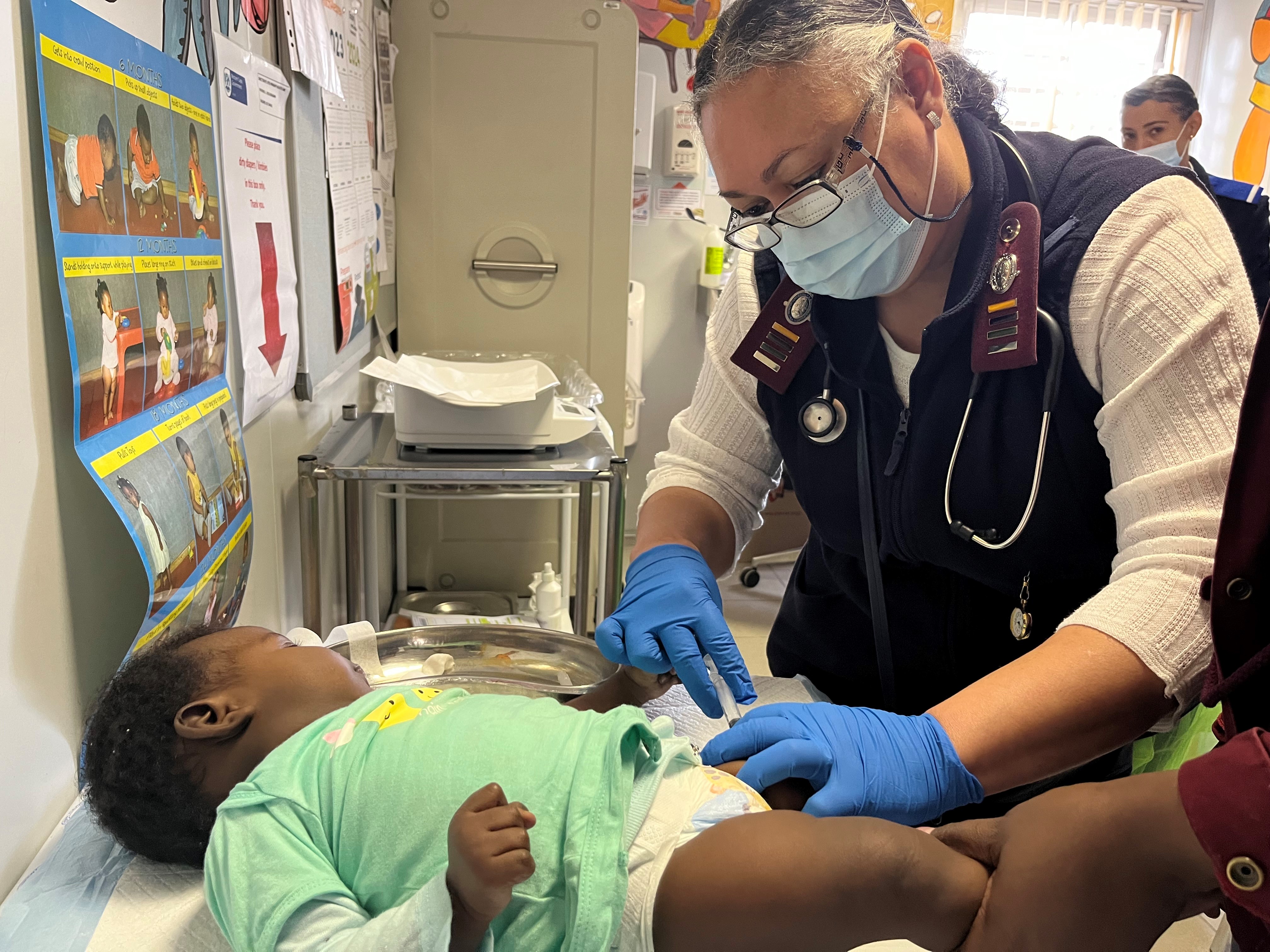
News
Protect our children under 5 during Paediatric Surge Season
As the Paediatric Surge Season (PSS) gets underway, the Western Cape Department of Health and Wellness urges parents and caregivers to take the necessary precautions to protect all children against preventable and treatable diarrhoeal disease over the next months. Our healthcare facilities are able to diagnose and treat diarrhoea and a host of other ailments affecting children. Our staff are also able to provide advice and guidance on nutrition, the lack of which plays a role in diarrhoea.
Paediatric Surge Season starts in November until May every year, with healthcare facilities seeing an increase in diarrhoeal and pneumonia cases among children, particularly children under the age of five, during this time.
If a child with diarrhoea is given the proper care and treatment, he or she can recover completely in a few days. Diarrhoea can also lead to dehydration and this can cause serious health problems. This is why knowing the signs that a child needs help and what to do can save their life.
In the Northern and Tygerberg Substructure, between November 2022 and May 2023, a total of 1 837 children were treated for diarrhoea in the Northern health sub-district. Of these 1 837 cases of children presenting with diarrhoea, at least 113 children also had dehydration, with 21 children being severely dehydrated. In the Northern sub-district, these children were treated at primary health care facility level.
In the Tygerberg health sub-district, a total of 4 085 children were treated for diarrhoea. Of these 4 085 cases of children, 647 children also had dehydration and 32 children were severely dehydrated. The number of children treated for diarrhoea in the Tygerberg sub-district includes data from admissions to Karl Bremer and Tygerberg hospitals.
The children who presented with diarrhoea and severe dehydration were referred and admitted to hospital for treatment. All children who are identified and presenting at primary health care level (day hospitals or clinics) are referred to the community health worker for follow-up care, as well as the environmental health officers who investigate environmental factors that may have impacted on the child developing diarrhoea.
A total number of at least 77 children were admitted to hospital for treatment during the PSS for November 2022 – May 2023 in the Northern and Tygerberg District.
According to the World Health Organisation, diarrhoeal disease is the second leading cause of death in children under five years old and was responsible for the deaths of 370,000 children in 2019.
“We encourage all parents to be aware of the risks and to take precautions to protect their children during paediatric surge season. Our healthcare staff are trained and equipped to support you and your children, and we have free oral rehydration solutions (ORS) available at our clinics. Various awareness campaigns take place throughout the year to educate parents and caregivers about the risks and treatment options, as well as preventative measures parents can take,” says Delray Fourie, Deputy Director for Comprehensive Health Services in the Northern and Tygerberg Substructure.
Causes and prevention
Diarrhoea can last several days and can leave the body without the water and salts that are necessary for survival.
There are three clinical types of diarrhoea:
- acute watery diarrhoea – lasts several hours or days;
- acute bloody diarrhoea – also called dysentery; and
- persistent diarrhoea – lasts 14 days or longer.
Diarrhoea is usually a symptom of an infection in the intestinal tract, which can be caused by a variety of bacterial, viral and parasitic organisms. Infection is spread through contaminated food or drinking-water, or from person-to-person as a result of poor hygiene.
“Diarrhoea is a highly infectious virus that thrives in hot weather. Children who are malnourished, have impaired immunity or those who have missed immunisations or Vitamin A supplementation are far more likely to contract diarrhoea and may develop complications as a result if not treated. We encourage parents and caregivers to ensure that their little one’s immunisations and vitamin A supplementation are up to date. If you’ve missed an immunisation or vitamin A supplementation dose, you can still visit your local clinic, remember to take along your child’s Road to Health booklet,” says Ms Fourie.
There are steps we can take to protect children such as regular handwashing, where possible. Unclean hands can increase the spread of viruses. Teach your children to clean their hands after using the toilet and before and after meals. It is also important to keep your child’s feeding bottles and cups, bowls, and teats clean by sterilising them before feeding your child.
Due to warmer weather, food can be easily become spoilt. This can also lead to diarrhoea and later dehydration. It is important that we try to keep our hands, food, cooking utensils and toilets clean.
Dustbins must be closed, animal faeces collected and thrown away, and food scrapings, used nappies and sanitary towels put into a plastic bag, knotted securely and thrown into a dustbin. Remember to wash your hands after completing these tasks.
The World Health Organisation also recommends exclusive breastfeeding for the first six months of life. Advantages include a lower risk of gastrointestinal infection for the baby and helping to build the immunity of the child.
You should also ensure that your child gets the rotavirus vaccination, which is considered effective in preventing severe diarrhoea.
Signs that your child needs help
Diarrhoea can increase the risk of your child becoming dehydrated. This is due to water and electrolytes (sodium, chloride, potassium and bicarbonate) being lost with liquid stools, vomit, sweat, urine and breathing. Dehydration occurs when these losses are not replaced.
If your child gets diarrhoea, check them for these signs of dehydration:
- Dry or sticky mouth;
- Does not want to accept milk feeds (breastmilk or infant formula) or eat;
- Few or no tears when crying;
- Lack of urine, or only a very small amount of dark yellow urine;
- Dry, cool skin;
- Tiredness and irritability;
- Dizziness;
- Headache and stomach ache; and
- Thirstiness.
If your child shows any symptoms of dehydration or you are not sure seek help at your nearest clinic or hospital (if after hours). Do not wait in line, go directly to the healthcare worker or reception desk and let them know your child has diarrhoea and possible dehydration.
Prepare an oral rehydration solution to replace the lost bodily fluids by following these steps. Using a clean 1 L bottle. Mix 1 L boiled and cooled water with ½ level teaspoon of salt and 8 level teaspoons of sugar. Mix well. Take the solution with you should you need to take your child to the clinic so that your child does not dehydrate on the way. Offer the child sips between and after every loose stool. Do not stop offering food or milk feeds.
It is also important to recognise the signs that your child requires immediate medical care. These signs include:
- Rapid breathing. It is a symptom of pneumonia and diarrhea;
- Chest retraction;
- If your child does not drink and/or vomits everything up;
- If your child has convulsions;
- Your child is weak and just stares into nothingness;
- There is blood in the stool; and
- Your child is very sleepy or does not want to wake up.
Do not hesitate to seek help urgently if your child displays these warning signs. Visit your nearest healthcare facility or call an ambulance on 10177 immediately.
More information:
First 1 000 Days: https://www.westerncape.gov.za/first-1000-days





